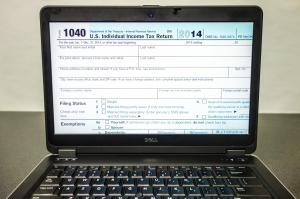The IRS is asking for stimulus payments that were mistakingly sent to prisoners across the U.S. Hundreds of thousands of dollars in payments have been sent to incarcerated persons, and though the legislation authorizing the payments during the pandemic doesn’t exclude inmates, and the agency won’t state what legal authority it’s acting on.
“I can’t give you the legal basis. All I can tell you is this is the language the Treasury and ourselves have been using,” IRS spokesman Eric Smith said on Tuesday, according to TIME. “It’s just the same list as in the Social Security Act.” On IRS.gov, it points to the Social Security Act, which does prevent incarcerated people from receiving certain types of old-age and survivor insurance benefit payments. However, not everyone is buying their excuse.
Videos by PopCulture.com
Tax attorney Kelly Erb argues that there’s no legal basis for asking inmates to return their stimulus checks. “I think it’s really disingenuous of the IRS,” Erb explained. “It’s not a rule just because the IRS puts it on the website. In fact, the IRS actually says that stuff on its website isn’t legal authority. So there’s no actual rule — it’s just guidance — and that guidance can change at any time.”
There’s no comprehensive number behind the number of checks being sent out, due largely to how different states are handling the IRS’s request to intercept these payments. However, the Kansas Department of Correction alone intercepted more than $200,000 by June, while Idaho and Montana combined had seized over $90,000. Washington state had only intercepted about $23,000 in that same timeframe, while other states aren’t releasing their numbers. However, officials in Vermont, Mississippi, Pennsylvania, Arizona and California estimated that they each had intercepted fewer than a dozen checks by June. Oregon prison officials had seized 25 payments, with 21 returned to the IRS and four others given to inmates’ relatives or other joint tax filers.
Wanda Bertram, a spokeswoman for the Prison Policy Initiative, which focuses on the harm of mass incarceration, says prison officials are accustomed to intercepting tax documents to screen for potential scams, priming them to follow this request. “It appears that the IRS is just making this up,” Bertram said. She added that inmates and their families are in need of the money, particularly as thousands get released to help slow the spread of coronavirus. “Loved ones right now are also under a squeeze because of the pandemic and being out of a job, so when you send a stimulus check for someone, the person in prison is not the only one who benefits from that,” she continued.



